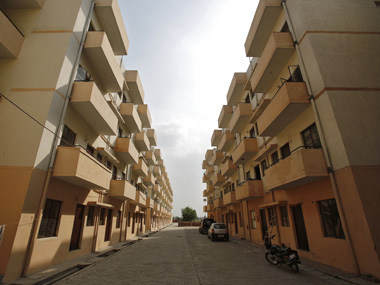Disappointment over a diluted Real Estate (Regulation and Development) Act is only sinking in, with consumers waking up to the reality that most of the state governments that have notified the rules are favouring the builders.
That as of 1 May 2017 only nine states have notified the rules itself shows how hesitant politicians are in regulating a sector which has paid them high dividends. The states that have notified the rules are Andhra Pradesh, Bihar, Gujarat, Kerala, Madhya Pradesh, Maharashtra, Odisha, Rajasthan, and Uttar Pradesh.
Apart from these states, six union territories namely Andaman and Nicobar Islands, Chandigarh, Dadra and Nagar Haveli, Daman and Diu, Lakshadweep, and National Capital Territory of Delhi have also notified the rules.
Rating agency Icra has warned that delay in issuing notification and non-uniformity of the rules across the states may dilute the effectiveness of the Act, which was originally buyer-friendly.
“The absence of regulator or appropriate rules cam resilt om a regulatory vaccum and dilution of the Act’s provisions,” Icra said in a note.
Crisil, another rating agency, has, meanwhile, come out with a comparison of rules thus far notified by the nine states.
The following chart will help you understand and compare how much each state has diluted the rules.
According to Crisil, major points of disconnect between the state rules and the central Act are three: definition of ongoing projects, penalties for non-compliance with the Act and payment schedule and liability in case of structural defects.
“RERA 2016 includes projects that are ongoing on the date of commencement of the Act (i.e., May 1, 2017), and for which the completion certificate has not been issued. However, Andhra Pradesh, Kerala and Uttar Pradesh have altered this definition in their notified rules,” the rating agency said.
Similarly on penalties, RERA 2016 recommends imprisonment for a term which may extend up to three years, or fine which may extend up to 10 percent of the estimated cost of the real estate project, or both, in case of non-compliance with the Act. However, most states have added a clause of compounding of offence to avoid imprisonment.
When it comes to payment schedule and liability, the central legislation stipulates that the model sale agreement is required to specify 10 percent advance payment, or charge an application fee from buyers, while entering into a written agreement for sale. In addition, in case of any structural defects arising within five years of handing over the possession of project to buyers, developers will be liable to rectify such defects without further charge. However, there is no clarity on these clauses in most states’ RERA notifications, Crisil has noted.
Andhra Pradesh, which notified the rules on 27 March 2017, has diluted the definition of ongoing projects. The definition includes ongoing projects with conditions. It excludes projects where roads, open spaces, amenities and services have been handed over to the local authority in layout projects, or where all slabs are laid in housing projects, or where all developmental works have been completed and sale/ lease deeds of 50 percent of the apartments/ houses/ plots have been executed, or where development works have been completed and application has been filed to the competent authority for issue of completion or occupancy certificate.
The state has also softened the penalties for non-compliance by diluting compounding of offence clause included to avoid imprisonment.
Bihar had notified the rules on 27 April 2017. The state’s rules diluted the penalties for non-compliance by including the compounding of offence clause to avoid imprisonment. Also there is no clarity on the rules related to payment schedule, according to Crisil.
Gujarat is a state which notified the rules long back on 29 October 2016. However, the rules seem to be put in place in a hurry and without much care as many key points are not even mentioned in them. According to Crisil, the rules do not have the definition of on-going projects, mention of penalties for non-compliance and payment schedule. They have put in place neither the norms for escrow withdrawal nor clause for structural defects. All in all, it looks like a shoddy work on the state government’s part.
Notified on 3 February 2016, Kerala was the first state government to put the rules in place. However, they also contain some of the most diluted provisions favouring the builders’ lobby. The Kerala rules have diluted the definition of ongoing projects by adding conditions to the ongoing projects. They exclude all on-going projects where the promoter has received all requisite approvals/ permits for the development of the real estate project prior to commencement of the Act.
The norms for escrow withdrawal has no clarity, making it easier for the builders to use the money put in the separate account. The clause for structural defects has been diluted by setting a time frame of within five years from possession. Developers are allowed to rectify such defects without further charge within 30 days.
Madhya Pradesh notified the rules on 22 October 2016 by diluting the penalties for non-compliance by including the compounding of offence clause to avoid imprisonment. Further there is no mention of payment schedule and clause for structural defects. The rules do not offer any clarity on norms for escrow withdrawal.
Maharashtra, which notified the rules on 20 April 2017, diluted the penalties for non-compliance. The rules do not mention imprisonment penalties. They do not have any clarity on monetary fines/ penalties as percentage of total project cost, Crisil has noted.
Further payment schedule is in line with the central Act, but with conditions, says Crisil. Buyers have to make 10 percent advance payment or an application fee from buyers while entering into a written agreement for sale. Model agreement mandates buyers to pay up to 30 percent of total consideration on execution of the agreement, and additionally, up to 15 percent of total consideration on completion of plinth work. The remaining payment has to be as per clauses mentioned in the model sale agreement.
Meanwhile, Odisha has diluted the penalties for non-compliance and there is no clarity on payment schedule. Rajasthan, which notified the rule on the day of the deadline, too has diluted the penalties for non-compliance for the builder. Further the cluase for structural defects lacks clarity. Developers are allowed to rectify such defects without further charge, says Crisil.
Uttar Pradesh, meanwhile, has diluted the definition of the ongoing projects and also the penalties for non-compliance. Further there is no clarity in the rules for payment schedule.


)




)
)
)
)
)
)